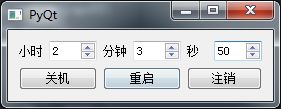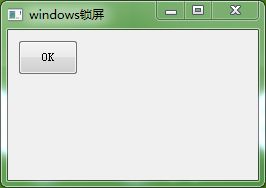关于Python 获取windows信息收集
收集一些Python操作windows的代码 (不管是自带的or第三方库)均来自网上
1.shutdown 操作
定时关机、重启、注销
#!/usr/bin/python #-*-coding:utf-8-*- #shutdown.py import sys#导入 import os from PyQt4.QtCore import * from PyQt4.QtGui import * class ShutDown(QWidget): def __init__(self): super(ShutDown, self).__init__() self.setWindowTitle('PyQt') self.hourLabel = QLabel(u'小时')#标签 self.minuteLabel = QLabel(u'分钟') self.secondLabel = QLabel(u'秒') self.shutDownButton = QPushButton()#按钮 self.shutDownButton.setText(u'关机') self.shutDownButton.clicked.connect(self.confirm_shutdown) self.rebootButton = QPushButton() self.rebootButton.setText(u'重启') self.rebootButton.clicked.connect(self.confirm_reboot) self.logoffButton = QPushButton() self.logoffButton.setText(u'注销') self.logoffButton.clicked.connect(self.confirm_logoff) self.hourSpinBox = QSpinBox() self.hourSpinBox.setRange(0,1000) self.hourSpinBox.setSingleStep(1) self.hourSpinBox.setValue(0) self.minuteSpinBox = QSpinBox() self.minuteSpinBox.setRange(0,1000) self.minuteSpinBox.setSingleStep(1) self.minuteSpinBox.setValue(0) self.secondSpinBox = QSpinBox() self.secondSpinBox.setRange(0,1000) self.secondSpinBox.setSingleStep(1) self.secondSpinBox.setValue(0) self.layout = QGridLayout()#网格布局 self.layout.addWidget(self.hourLabel,1,0) self.layout.addWidget(self.hourSpinBox,1,1) self.layout.addWidget(self.minuteLabel,1,2) self.layout.addWidget(self.minuteSpinBox,1,3) self.layout.addWidget(self.secondLabel,1,4) self.layout.addWidget(self.secondSpinBox,1,5) self.layout.addWidget(self.shutDownButton,2,0,2,2) self.layout.addWidget(self.rebootButton,2,2,2,2) self.layout.addWidget(self.logoffButton,2,4,2,2) self.setLayout(self.layout) def confirm_shutdown(self): self.time = (self.hourSpinBox.value() * 3600 + self.minuteSpinBox.value() * 60 + self.secondSpinBox.value()) shutdown = 'C:\Windows\System32\shutdown.exe -s -t ' + str(self.time) os.system(shutdown) sys.exit(0) def confirm_reboot(self): reboot = 'C:\Windows\System32\shutdown.exe -r' os.system(reboot) sys.exit(0) def confirm_logoff(self): logoff = 'C:\Windows\System32\shutdown.exe -l' os.system(logoff) sys.exit(0) if __name__ == '__main__': app = QApplication(sys.argv) shutdown = ShutDown() shutdown.show() sys.exit(app.exec_())

2.windows锁屏
相当与WIN+L 操作
1 # -*- coding: utf-8 -*- 2 # python在windows锁屏的代码 3 import sys 4 from ctypes import * 5 from PyQt4 import QtGui, QtCore 6 try: 7 _fromUtf8 = QtCore.QString.fromUtf8 8 except AttributeError: 9 def _fromUtf8(s): 10 return s 11 12 class QuitButton(QtGui.QWidget): 13 def __init__(self, parent=None): 14 QtGui.QWidget.__init__(self, parent) 15 self.setGeometry(300, 300, 250, 150) 16 self.setWindowTitle(_fromUtf8('windows锁屏')) #utf8 输出中文 17 lockscreen = QtGui.QPushButton('OK', self) 18 lockscreen.setGeometry(10, 10, 60, 35) 19 QtCore.QObject.connect(lockscreen, QtCore.SIGNAL('clicked()'), self.win_L) #self.win_L 点击执行 20 def win_L(self): 21 user32 = windll.LoadLibrary('user32.dll') 22 user32.LockWorkStation() 23 24 class lockScr(QtGui.QWidget): 25 def __init__(self): 26 QtGui.QWidget.__init__(self) 27 def win_L(self): 28 user32 = windll.LoadLibrary('user32.dll') 29 user32.LockWorkStation() 30 31 app = QtGui.QApplication(sys.argv) 32 qb = QuitButton() 33 qb.show() 34 sys.exit(app.exec_())

3.获取电脑的基本信息
引用第三方库WMI 可以查看到 windows当前的版本、位数X86(64)、进程数目、CPU类型和使用率、硬盘的分区和使用率、Ip地址和Mac地址、 详细进程数据等
1 #!/usr/bin/env python 2 # -*- coding: utf-8 -*- 3 4 import wmi 5 import os 6 import sys 7 import platform 8 import time 9 import sys 10 reload(sys) 11 sys.setdefaultencoding( "utf-8" ) 12 def sys_version(): 13 c = wmi.WMI () 14 #获取操作系统版本 15 for sys in c.Win32_OperatingSystem(): 16 print u"Version:%s" % sys.Caption,"Vernum:%s" % sys.BuildNumber 17 print sys.OSArchitecture#系统是32位还是64位的 18 print sys.NumberOfProcesses #当前系统运行的进程总数 19 20 def cpu_mem(): 21 c = wmi.WMI () 22 #CPU类型和内存 23 for processor in c.Win32_Processor(): 24 #print "Processor ID: %s" % processor.DeviceID 25 print "Process Name: %s" % processor.Name.strip() 26 for Memory in c.Win32_PhysicalMemory(): 27 print "Memory Capacity: %.fMB" %(int(Memory.Capacity)/1048576) 28 29 def cpu_use(): 30 #5s取一次CPU的使用率 31 c = wmi.WMI() 32 while True: 33 for cpu in c.Win32_Processor(): 34 timestamp = time.strftime('%a, %d %b %Y %H:%M:%S', time.localtime()) 35 print '%s | Utilization: %s: %d %%' % (timestamp, cpu.DeviceID, cpu.LoadPercentage) 36 time.sleep(5) 37 break 38 39 def disk(): 40 c = wmi.WMI () 41 #获取硬盘分区 42 for physical_disk in c.Win32_DiskDrive (): 43 for partition in physical_disk.associators ("Win32_DiskDriveToDiskPartition"): 44 for logical_disk in partition.associators ("Win32_LogicalDiskToPartition"): 45 print physical_disk.Caption, partition.Caption, logical_disk.Caption 46 47 #获取硬盘使用百分情况 48 for disk in c.Win32_LogicalDisk (DriveType=3): 49 print disk.Caption, "%0.2f%% free" % (100.0 * long (disk.FreeSpace) / long (disk.Size)) 50 51 def network(): 52 c = wmi.WMI () 53 #获取MAC和IP地址 54 for interface in c.Win32_NetworkAdapterConfiguration (IPEnabled=1): 55 print "MAC: %s" % interface.MACAddress 56 for ip_address in interface.IPAddress: 57 print "ip_add: %s" % ip_address 58 print 59 60 #获取自启动程序的位置 61 for s in c.Win32_StartupCommand (): 62 print "[%s] %s <%s>" % (s.Location, s.Caption, s.Command) 63 64 65 #获取当前运行的进程 66 for process in c.Win32_Process (): 67 print process.ProcessId, process.Name 68 69 def main(): 70 sys_version() 71 cpu_mem() 72 disk() 73 network() 74 #cpu_use() 75 76 if __name__ == '__main__': 77 main() 78 print platform.system() 79 print platform.release() 80 print platform.version() 81 print platform.platform() 82 print platform.machine()